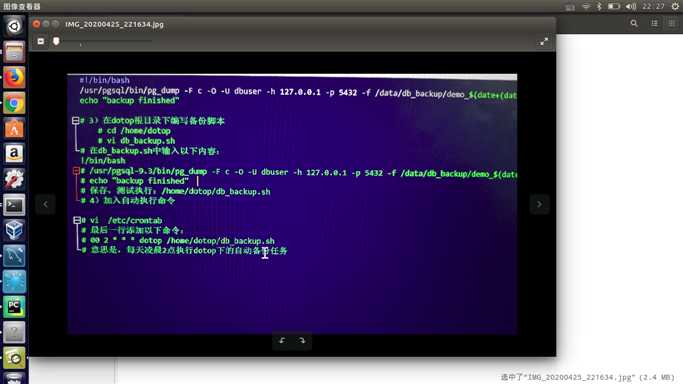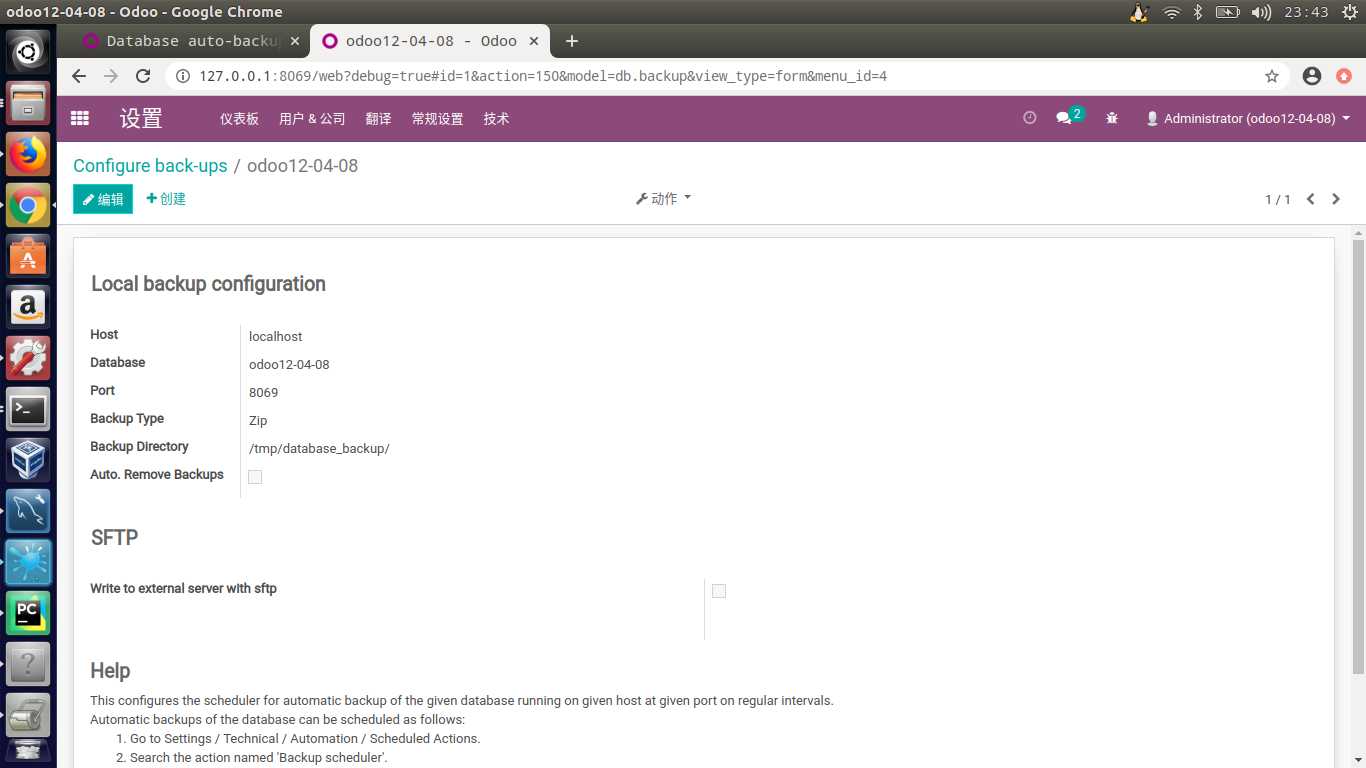标签:func boolean let turn tool external sock global sudo
一、linux數據庫備份腳本
1、数据库备份,命令如下:
./pg_dump -h localhost -p 5432 -U postgres -W -F c -b -v -f "/opt/xxx.backup" xxx
2.在数据库安装目录bin下,./psql 进入数据库,输入密码,\c xxx(数据库名称) 进入指定数据库
\i 文件路径
postgresql數據庫:
备份:pg_dump -h localhost -p 5432 -U tradesns -W -F c -b -v -f "/home/tradeworkwangbin/us2010.backup" us2010恢复:pg_restore -h 127.0.0.1 -p 5432 -U postgres -W -d zjyj_gxversion -v "/opt/zjyj_gxversion_0410.backup"
db_backup.sh
#!/bin/bash
/usr/pgsql/bin/pg_dump -F c -O -U dbuser -h 127.0.0.1 -p 5432 -f /data/db_backup/demo_$(date+(date+%Y%m%d_%H_%M_%S).sql dotop
echo "backup finished"

二、python腳本備份數據庫
#!/usr/bin/env python3 # -*- coding: utf-8 -*- """ Created on Sat Apr 25 22:05:43 2020 @author: root """ import os import sys import psycopg2 import time db_host=‘127.0.0.1‘ db_port=5432 db_user=‘odoo‘ db_password=‘odoo‘ db_default=‘postgres‘ backup_path="/usr/local/pgsql/dba/exp" log_success="/usr/local/pgsql/dba/exp/log_success.txt" log_error="/usr/local/pgsql/dba/exp/log_error.txt" mail_list="xxxxx" backup_day=time.strftime("%Y%m%d") def check_backup_path(): if not os.path.exists(backup_path): os.mkdir(backup_path) def get_all_databases(): global databases try: conn=psycopg2.connect(host=db_host,port=db_port,user=db_user,password=db_password,database=db_default) except BaseException as e: with open(log_error,"a",encoding="utf-8") as f: f.truncate() f.write(str(e)) os.system("/bin/mailx -s ‘[Urgent]:Database on {0} connect failed, please check.‘ {1} < {2}".format( db_host, mail_list, log_error)) else: cur = conn.cursor() cur.execute("select datname from pg_database where datname not in(‘template0‘,‘template1‘,‘postgres‘)") rows = cur.fetchall() for row in rows: databases.append(list(row)) conn.close() def backup_all_databases(): global databases try: for database in databases: db = str(database).replace(‘[‘, ‘‘).replace(‘]‘, ‘‘) os.system("/usr/local/pgsql/bin/pg_dump --verbose --create {0} | gzip > {2}/{0}_{1}_sql.gz".format( db, backup_day, backup_path)) with open(log_success, "a", encoding="utf-8") as f: f.write("Database {0} backup finished...\n".format(db)) except BaseException as e: with open(log_error, "a", encoding="utf-8") as f: f.truncate() f.write(str(e)) os.system("/bin/mailx -s ‘[Urgent]:Database {0} backup failed, please check.‘ {1}} < {2}".format( db, mail_list, log_error)) else: os.system("/bin/mailx -s ‘All Database backup finished.‘ {0} < {1}".format(mail_list, log_success)) check_backup_path() get_all_databases() backup_all_databases()
三、odoo裏面備份數據庫
# -*- coding: utf-8 -*- from odoo import models, fields, api, tools, _ from odoo.exceptions import Warning import odoo from odoo.http import content_disposition import logging _logger = logging.getLogger(__name__) from ftplib import FTP import os import datetime try: from xmlrpc import client as xmlrpclib except ImportError: import xmlrpclib import time import base64 import socket try: import paramiko except ImportError: raise ImportError( ‘This module needs paramiko to automatically write backups to the FTP through SFTP. Please install paramiko on your system. (sudo pip3 install paramiko)‘) def execute(connector, method, *args): res = False try: res = getattr(connector, method)(*args) except socket.error as error: _logger.critical(‘Error while executing the method "execute". Error: ‘ + str(error)) raise error return res class db_backup(models.Model): _name = ‘db.backup‘ _description = ‘Backup configuration record‘ @api.multi def get_db_list(self, host, port, context={}): uri = ‘http://‘ + host + ‘:‘ + port conn = xmlrpclib.ServerProxy(uri + ‘/xmlrpc/db‘) db_list = execute(conn, ‘list‘) return db_list @api.multi def _get_db_name(self): dbName = self._cr.dbname return dbName # Columns for local server configuration host = fields.Char(‘Host‘, required=True, default=‘localhost‘) port = fields.Char(‘Port‘, required=True, default=8069) name = fields.Char(‘Database‘, required=True, help=‘Database you want to schedule backups for‘, default=_get_db_name) folder = fields.Char(‘Backup Directory‘, help=‘Absolute path for storing the backups‘, required=‘True‘, default=‘/odoo/backups‘) backup_type = fields.Selection([(‘zip‘, ‘Zip‘), (‘dump‘, ‘Dump‘)], ‘Backup Type‘, required=True, default=‘zip‘) autoremove = fields.Boolean(‘Auto. Remove Backups‘, help=‘If you check this option you can choose to automaticly remove the backup after xx days‘) days_to_keep = fields.Integer(‘Remove after x days‘, help="Choose after how many days the backup should be deleted. For example:\nIf you fill in 5 the backups will be removed after 5 days.", required=True) # Columns for external server (SFTP) sftp_write = fields.Boolean(‘Write to external server with sftp‘, help="If you check this option you can specify the details needed to write to a remote server with SFTP.") sftp_path = fields.Char(‘Path external server‘, help=‘The location to the folder where the dumps should be written to. For example /odoo/backups/.\nFiles will then be written to /odoo/backups/ on your remote server.‘) sftp_host = fields.Char(‘IP Address SFTP Server‘, help=‘The IP address from your remote server. For example 192.168.0.1‘) sftp_port = fields.Integer(‘SFTP Port‘, help=‘The port on the FTP server that accepts SSH/SFTP calls.‘, default=22) sftp_user = fields.Char(‘Username SFTP Server‘, help=‘The username where the SFTP connection should be made with. This is the user on the external server.‘) sftp_password = fields.Char(‘Password User SFTP Server‘, help=‘The password from the user where the SFTP connection should be made with. This is the password from the user on the external server.‘) days_to_keep_sftp = fields.Integer(‘Remove SFTP after x days‘, help=‘Choose after how many days the backup should be deleted from the FTP server. For example:\nIf you fill in 5 the backups will be removed after 5 days from the FTP server.‘, default=30) send_mail_sftp_fail = fields.Boolean(‘Auto. E-mail on backup fail‘, help=‘If you check this option you can choose to automaticly get e-mailed when the backup to the external server failed.‘) email_to_notify = fields.Char(‘E-mail to notify‘, help=‘Fill in the e-mail where you want to be notified that the backup failed on the FTP.‘) @api.multi def _check_db_exist(self): self.ensure_one() db_list = self.get_db_list(self.host, self.port) if self.name in db_list: return True return False _constraints = [(_check_db_exist, _(‘Error ! No such database exists!‘), [])] @api.multi def test_sftp_connection(self, context=None): self.ensure_one() # Check if there is a success or fail and write messages messageTitle = "" messageContent = "" error = "" has_failed = False for rec in self: db_list = self.get_db_list(rec.host, rec.port) pathToWriteTo = rec.sftp_path ipHost = rec.sftp_host portHost = rec.sftp_port usernameLogin = rec.sftp_user passwordLogin = rec.sftp_password # Connect with external server over SFTP, so we know sure that everything works. try: s = paramiko.SSHClient() s.set_missing_host_key_policy(paramiko.AutoAddPolicy()) s.connect(ipHost, portHost, usernameLogin, passwordLogin, timeout=10) sftp = s.open_sftp() messageTitle = _("Connection Test Succeeded!\nEverything seems properly set up for FTP back-ups!") except Exception as e: _logger.critical(‘There was a problem connecting to the remote ftp: ‘ + str(e)) error += str(e) has_failed = True messageTitle = _("Connection Test Failed!") if len(rec.sftp_host) < 8: messageContent += "\nYour IP address seems to be too short.\n" messageContent += _("Here is what we got instead:\n") finally: if s: s.close() if has_failed: raise Warning(messageTitle + ‘\n\n‘ + messageContent + "%s" % str(error)) else: raise Warning(messageTitle + ‘\n\n‘ + messageContent) @api.model def schedule_backup(self): conf_ids = self.search([]) for rec in conf_ids: db_list = self.get_db_list(rec.host, rec.port) if rec.name in db_list: try: if not os.path.isdir(rec.folder): os.makedirs(rec.folder) except: raise # Create name for dumpfile. bkp_file = ‘%s_%s.%s‘ % (time.strftime(‘%Y_%m_%d_%H_%M_%S‘), rec.name, rec.backup_type) file_path = os.path.join(rec.folder, bkp_file) uri = ‘http://‘ + rec.host + ‘:‘ + rec.port conn = xmlrpclib.ServerProxy(uri + ‘/xmlrpc/db‘) bkp = ‘‘ try: # try to backup database and write it away fp = open(file_path, ‘wb‘) odoo.service.db.dump_db(rec.name, fp, rec.backup_type) fp.close() except Exception as error: _logger.debug( "Couldn‘t backup database %s. Bad database administrator password for server running at http://%s:%s" % ( rec.name, rec.host, rec.port)) _logger.debug("Exact error from the exception: " + str(error)) continue else: _logger.debug("database %s doesn‘t exist on http://%s:%s" % (rec.name, rec.host, rec.port)) # Check if user wants to write to SFTP or not. if rec.sftp_write is True: try: # Store all values in variables dir = rec.folder pathToWriteTo = rec.sftp_path ipHost = rec.sftp_host portHost = rec.sftp_port usernameLogin = rec.sftp_user passwordLogin = rec.sftp_password _logger.debug(‘sftp remote path: %s‘ % pathToWriteTo) try: s = paramiko.SSHClient() s.set_missing_host_key_policy(paramiko.AutoAddPolicy()) s.connect(ipHost, portHost, usernameLogin, passwordLogin, timeout=20) sftp = s.open_sftp() except Exception as error: _logger.critical(‘Error connecting to remote server! Error: ‘ + str(error)) try: sftp.chdir(pathToWriteTo) except IOError: # Create directory and subdirs if they do not exist. currentDir = ‘‘ for dirElement in pathToWriteTo.split(‘/‘): currentDir += dirElement + ‘/‘ try: sftp.chdir(currentDir) except: _logger.info(‘(Part of the) path didn\‘t exist. Creating it now at ‘ + currentDir) # Make directory and then navigate into it sftp.mkdir(currentDir, 777) sftp.chdir(currentDir) pass sftp.chdir(pathToWriteTo) # Loop over all files in the directory. for f in os.listdir(dir): if rec.name in f: fullpath = os.path.join(dir, f) if os.path.isfile(fullpath): try: sftp.stat(os.path.join(pathToWriteTo, f)) _logger.debug( ‘File %s already exists on the remote FTP Server ------ skipped‘ % fullpath) # This means the file does not exist (remote) yet! except IOError: try: # sftp.put(fullpath, pathToWriteTo) sftp.put(fullpath, os.path.join(pathToWriteTo, f)) _logger.info(‘Copying File % s------ success‘ % fullpath) except Exception as err: _logger.critical( ‘We couldn\‘t write the file to the remote server. Error: ‘ + str(err)) # Navigate in to the correct folder. sftp.chdir(pathToWriteTo) # Loop over all files in the directory from the back-ups. # We will check the creation date of every back-up. for file in sftp.listdir(pathToWriteTo): if rec.name in file: # Get the full path fullpath = os.path.join(pathToWriteTo, file) # Get the timestamp from the file on the external server timestamp = sftp.stat(fullpath).st_atime createtime = datetime.datetime.fromtimestamp(timestamp) now = datetime.datetime.now() delta = now - createtime # If the file is older than the days_to_keep_sftp (the days to keep that the user filled in on the Odoo form it will be removed. if delta.days >= rec.days_to_keep_sftp: # Only delete files, no directories! if sftp.isfile(fullpath) and (".dump" in file or ‘.zip‘ in file): _logger.info("Delete too old file from SFTP servers: " + file) sftp.unlink(file) # Close the SFTP session. sftp.close() except Exception as e: _logger.debug(‘Exception! We couldn\‘t back up to the FTP server..‘) # At this point the SFTP backup failed. We will now check if the user wants # an e-mail notification about this. if rec.send_mail_sftp_fail: try: ir_mail_server = self.env[‘ir.mail_server‘] message = "Dear,\n\nThe backup for the server " + rec.host + " (IP: " + rec.sftp_host + ") failed.Please check the following details:\n\nIP address SFTP server: " + rec.sftp_host + "\nUsername: " + rec.sftp_user + "\nPassword: " + rec.sftp_password + "\n\nError details: " + tools.ustr( e) + "\n\nWith kind regards" msg = ir_mail_server.build_email("auto_backup@" + rec.name + ".com", [rec.email_to_notify], "Backup from " + rec.host + "(" + rec.sftp_host + ") failed", message) ir_mail_server.send_email(self._cr, self._uid, msg) except Exception: pass """ Remove all old files (on local server) in case this is configured.. """ if rec.autoremove: dir = rec.folder # Loop over all files in the directory. for f in os.listdir(dir): fullpath = os.path.join(dir, f) # Only delete the ones wich are from the current database # (Makes it possible to save different databases in the same folder) if rec.name in fullpath: timestamp = os.stat(fullpath).st_ctime createtime = datetime.datetime.fromtimestamp(timestamp) now = datetime.datetime.now() delta = now - createtime if delta.days >= rec.days_to_keep: # Only delete files (which are .dump and .zip), no directories. if os.path.isfile(fullpath) and (".dump" in f or ‘.zip‘ in f): _logger.info("Delete local out-of-date file: " + fullpath) os.remove(fullpath)

标签:func boolean let turn tool external sock global sudo
原文地址:https://www.cnblogs.com/1314520xh/p/12776105.html